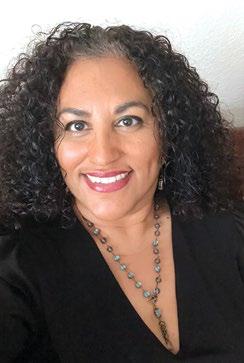
3 minute read
The Push for More Latinas in Higher Education
By Beatriz Palmer, Program Manager, Service Learning & Volunteer Center
According to Excelencia in Education, as of fall 2020, 48% of women attending a Hispanic Serving Institution of higher education are Latinas, and we make up two-thirds of the student population at these universities.
Advertisement
Even though we are completing degrees at higher rate than male Latinos, we still have room for growth, because only 29% of us have completed an associate or higher degree. According to the National Center for Education Statistics, in 2018–2019, Latinas held 15.7% of bachelor’s degrees, 11.6% of master’s degrees, and only 8.8% of doctoral degrees.
We need more of us to apply for school and mentor other
BEATRIZ PALMER: From Farmworker to Program Director and Doctoral Student
“To think about me in education makes me really emotional because my mom and dad didn’t know how to read and write…,” Beatriz (Bea) Palmer, the program manager at MiraCosta College’s Service Learning & Volunteer Center, told North County Informador.
Bea shared her education journey as a self-identifying Black Indigenous Latina who is a first-generation high school and college graduate, now studying for her doctoral degree in Higher Education at San Diego State.

“My parents were farmworkers, so for me, this is a new playing field. I know that growing up, a lot of my teachers didn’t look like me,” she said. Today, she recognizes the responsibility she has in influencing others.
Bea grew up “undocumented” in Oceanside. Her family had moved 25 times by the time she was a high school senior. After getting amnesty, she attended MiraCosta College. “I was here like maybe three weeks, and I just don’t remember seeing anyone that looked like me,” so she switched to secretarial school.
“My parents would say, oh, you’re going to be a secretaria, because that’s as far as they can dream,” she explained.
hermanas so they can help get these statistics up. We can’t do this alone; we need each other! I am so humbled and proud of myself for stepping out of my comfort zone and applying for the master’s and then the doctoral degree. I am happy to report I finished the master’s in sociology from Arizona State University two years ago, during the pandemic, and I applied to the doctoral program at San Diego State University. I was one of 12 who was accepted! It’s also exciting because, to my surprise, about 60% of candidates in the program are Latinos! We are about to change our communities and the education system. ¡Pa’lante!
In her search for fulfillment, she applied for a secretarial position that took her back to MiraCosta, in service learning and volunteerism. Today, she is the program director.
“Now, the majority of our students doing service learning are Latinos because I helped place them back in the community,” she said. “I hear others doing the same… we’re telling our stories.”
Education can open doors and provide upward mobility, she said, “but it’s even bigger than that…Our whole life we’ve been told that working the ground with our hands was something to be ashamed of.” But without these workers, we wouldn’t have the produce we enjoy. “And education just opens your eyes to that,” she said.
She believes education helps people understand their identity and history without rejecting it or leaving their community behind. “Beatriz Palmer, the undocumented, first-generation is now telling her story so that others can learn about their own identity through Ethnic Studies,” a program she is helping design, she said.
In her sociology class at Central Texas College Camp Pendleton, Bea teaches students of all ethnicities to be authentic. “You have to own your greatness. You have it. You just have to own it,” she said.
Bea’s tips for success for college students
Find a mentor “that will pour into them, that will connect them with other people.”
Volunteer in community engagement and internships because it’s harder to do once you finish school. Use federal work study dollars to get paid and start developing skills and include volunteer hours on your résumés.
Education does not necessarily make you rich. Learn about financial literacy, school debt, and community college, where the first two years of higher education can be free.
Tap into local community colleges. They offer free classes, certificate classes, such as computers, English as a Second Language, even volunteerism. “There’s a path for everyone,” Bea said, for recent high school graduates, “all the way to the abuelitas.”
MiraCosta College can help students looking for that path. “We’re here to serve you,” said Bea. “We’re a Hispanicserving Institution. If there’s anyone looking for where to start, I would say, start here.”








